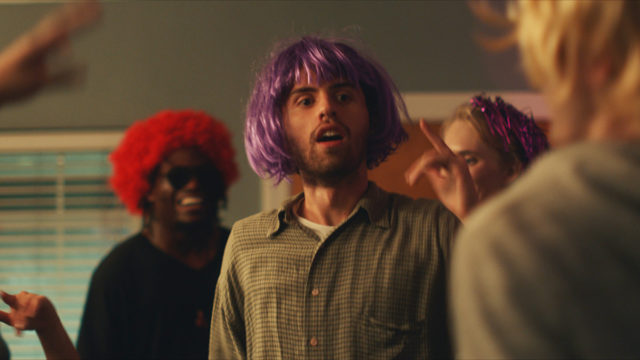A failed hookup turns into a contemplative and revealing night in “Shithouse.”
After winning a Grand Jury Award at the South by Southwest festival this year, Cooper Raiff’s directorial debut will be released Friday in select theaters and through video on demand. Raiff also stars as Alex, a homesick college freshman who finds himself on an emotional journey after an awkward night at the titular fraternity house. In acting as both director and protagonist, Raiff said he wanted to portray the vulnerability of youth through the intimate, unseen moments of college life.
“Everything that I will ever write and want to write (is) these small moments,” Raiff said. “I always want to watch those (in) a movie.”
[Related: ‘Chemical Hearts’ strives to encapsulate the complexities, emotions of adolescence]
It is in these quiet scenes that the film’s love story develops, focusing not only on romance but also familial love, he said. Though they only interact over the phone, Alex and his mom have an emotional arc that reflects on how growing up entails letting go of one’s childhood to build a new home. Raiff said the film highlights this idea from dual points of view – it is as difficult for parents to send their children out of their nest as it is for their children to get their footing in the world.
The frustration of creating a new home is also reflected in Raiff’s personal journey. He said his college experience taught him that no one is prepared for how confusing it is to leave home and grapple with the knowledge that one will never be a kid again.
But the theme of growth is present in each of the characters as they go through difficult periods of maturation, such as when Alex’s roommate Sam (Logan Miller) flubs at a comedy club. Miller said he appreciated how the film lingers in certain scenes to show the repercussions of the characters’ actions, lending the film a sense of real honesty as it portrays people through an unfiltered lens.
“In college movies like this, you only see the beautiful array of the night, but you never get to see the after-effects,” Miller said. “Because each character had that walk of shame, I felt it was more relatable in that time frame of life.”
[Related: ‘Yes, God, Yes’ examines relationship between religion and teen sexual exploration]
The feature also portrays the build-up and aftermath of the young romance between Alex and his resident assistant, Maggie (Dylan Gelula). Looking back on the genesis of the film, Gelula said she remembers Raiff being intimidated by her during their first meeting, paralleling the dynamic between the RA and freshman boy onscreen. But as the film progresses, Raiff said his and Gelula’s chemistry helped their performances bloom.
Certain elements of framing and editing were also used to maintain the actors’ connection and the fluidity of their performances. Though there were scenes that employed close-ups, wide-angle shots were preferred because of how they allow the chemistry to seep through the screen instead of cutting back and forth between the characters, Raiff said.
Beyond the technical elements, the actors’ line delivery further allowed everything to flow together naturally, Gelula said. In particular, Raiff said he was impressed by how the actors brought their writing skills to the roles, making sure that things didn’t sound forced and changing up dialogue when needed. The movie is made up of real conversations in real spaces, Miller said, which made it easy for the actors to create convincing characters.
Ultimately, the film progressed from a small student-made project to a feature that won the narrative feature competition at an American film festival. Raiff said that he was astonished by how his director of photography, Rachel Klein, was able to elevate the film through a visual language of colors paired with shot choices. He said seeing his vision come to fruition from a project filmed with friends to a production with a full cast and crew was eye-opening.
“I think the biggest thing was I was shocked by how amazing it looked,” Raiff said. “By the end, it felt like it had all the parts that an actual movie needs.”

